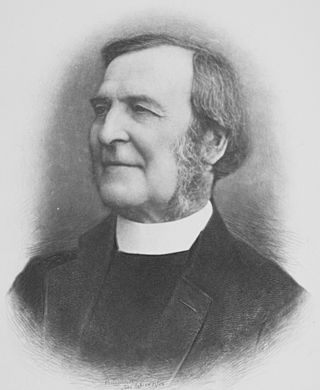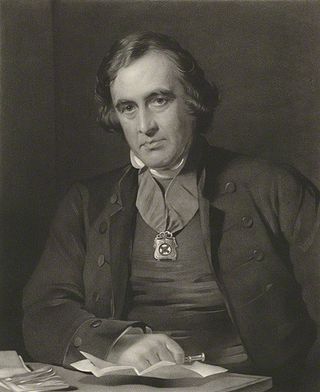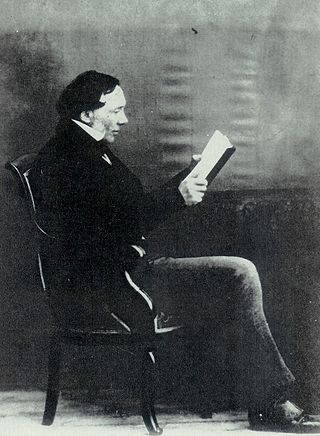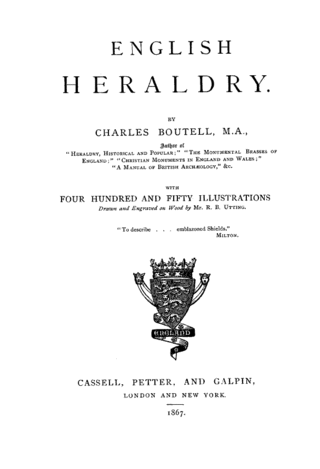Related Research Articles

An antiquarian or antiquary is an aficionado or student of antiquities or things of the past. More specifically, the term is used for those who study history with particular attention to ancient artifacts, archaeological and historic sites, or historic archives and manuscripts. The essence of antiquarianism is a focus on the empirical evidence of the past, and is perhaps best encapsulated in the motto adopted by the 18th-century antiquary Sir Richard Colt Hoare, "We speak from facts, not theory."

Frederick Temple was an English academic, teacher and churchman, who served as Bishop of Exeter (1869–1885), Bishop of London (1885–1896) and Archbishop of Canterbury (1896–1902).

Richard Chenevix Trench was an Anglican archbishop and poet.

Samuel Wilberforce, FRS was an English bishop in the Church of England, and the third son of William Wilberforce. Known as "Soapy Sam", Wilberforce was one of the greatest public speakers of his day. He is now best remembered for his opposition to Charles Darwin's theory of evolution at a debate in 1860.
Thomas or John Carte (1686–1754) was an English historian with Jacobite sympathies, who served as a Church of England clergyman.

Richard Rawlinson FRS was an English clergyman and antiquarian collector of books and manuscripts, which he bequeathed to the Bodleian Library, Oxford.
The Camden Society was a text publication society founded in London in 1838 to publish early historical and literary materials, both unpublished manuscripts and new editions of rare printed books. It was named after the 16th-century antiquary and historian William Camden. In 1897 it merged with the Royal Historical Society, which continues to publish texts in what are now known as the Camden Series.

Robert Isaac Wilberforce was an English clergyman and writer.

John Woodward was an English naturalist, antiquarian and geologist, and founder by bequest of the Woodwardian Professorship of Geology at the University of Cambridge. Though a leading supporter of observation and experiment in what we now call science, few of his theories have survived.

A text publication society is a learned society which publishes scholarly editions of old works of historical or literary interest, or archival documents. In addition to full texts, a text publication society may publish translations, calendars and indexes.

Ernest Roland Wilberforce was an Anglican clergyman and bishop. From 1882 to 1896 he was the first Anglican Bishop of Newcastle upon the diocese's creation, and from 1896 to 1907 he was Bishop of Chichester.
Joseph Stevenson was an English Church of England and later Catholic priest, archivist and editor of historical texts.
John Harding was an English clergyman, who served as Bishop of Bombay. He was the second Anglican bishop there, and held the post from 1851 to 1869, retiring in poor health.

Charles Boutell was an English archaeologist, antiquary and clergyman, publishing books on brasses, arms and armour and heraldry, often illustrated by his own drawings.

John Sheepshanks was an English Anglican Bishop in the last decade of the 19th century and the first one of the 20th.

Mark Antony Lower F.S.A. M.A. was a Sussex historian and schoolteacher who founded the Sussex Archaeological Society. An anti-Catholic propagandist, Lower is believed to have started the "cult of the Sussex Martyrs", although he was against the excesses of the "Bonfire Boys".
The Surtees Society is a text publication society and registered charity based in Durham in northern England. The society was established on 27 May 1834 by James Raine, following the death of the renowned County Durham antiquarian Robert Surtees. Raine and other former friends of Surtees created the society to honour his memory and carry on his legacy, with the focus on publishing documents relating to the region between the Humber estuary and Firth of Forth in the east and the River Mersey and the River Clyde in the west, the region that had once constituted the kingdom of Northumbria. Membership of the Society is by annual subscription. Members receive the book published for the year of subscription.

John Allen Giles (1808–1884) was an English historian. He was primarily known as a scholar of Anglo-Saxon language and history. He revised Stevens' translation of the Anglo-Saxon Chronicle and Bede's Ecclesiastical History of the English People. He was a fellow at Corpus Christi College, Oxford.
Charles William Boase (1828–1895) was an English academic, antiquarian and librarian.
Philippa Judith Amanda Levine, FRAI, FRHistS, is a historian of the British Empire, gender, race, science and technology. She has spent most of her career in the United States and has been Mary Helen Thompson Centennial Professor in the Humanities (2010–17) and Walter Prescott Webb Professor in History and Ideas at the University of Texas at Austin.
References
Footnotes
- ↑ Philippa Levine cites Bishop Samuel Wilberforce of Oxford, a leading critic of Charles Darwin's work towards a theory of evolution, to exemplify a belief that supporting endeavours such as the Caxton Society advanced a "Providential plan": in a speech given in 1857, "he declared that 'there was far more than the mere gratification of a somewhat idle curiosity when archaeologists ransacked the dust of antiquity. They were carrying out the great plan of the Creator and Ruler of the world.' History was invested with divine intention." [4]
- ↑ While Levine does not reference the failure of the Caxton Society directly, she observes that, in the 19th century, "[t]here were numerous ... cases of [similar] societies which, after a few volumes, simply ceased publishing. It was not a lack of demand that led to these failures nor a saturation of the market, [but rather the] aims [of these societies] were too much akin to those of the Camden Society whose early successes had established its supremacy in the field." [6]
Notes
- 1 2 3 Heylin 1851.
- 1 2 "Caxton Society. GB" (in French). Bibliothèque nationale de France. 5 October 2018. Archived from the original on 16 November 2018. Retrieved 16 November 2018.
- ↑ Levine 1986, pp. 50, 179.
- ↑ Levine 1986, p. 56.
- ↑ "Caxton Society" (PDF). Royal Historical Society. n.d. Archived (PDF) from the original on 16 November 2018. Retrieved 16 November 2018.
- ↑ Levine 1986, p. 66.